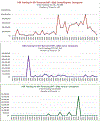African Immigrants and the End of the HIV Epidemic in the United States: Actionable Recommendations to Enhance Equity
- PMID: 40532123
- PMCID: PMC12257953
- DOI: 10.2105/AJPH.2025.308160
African Immigrants and the End of the HIV Epidemic in the United States: Actionable Recommendations to Enhance Equity
Abstract
African immigrants in the United States are disproportionately affected by HIV yet remain overlooked in public health strategies such as the Ending the HIV Epidemic (EHE) initiative. Many reside in EHE-prioritized counties, but their categorization under the broad "Black/African American" label obscures their distinct pathways to HIV acquisition and barriers to care. We explore how African immigrants can be more effectively prioritized in the EHE framework. We examine key challenges, including stigma, cultural and linguistic barriers, and structural inequities, that limit access to prevention and treatment services. Additionally, sociocultural factors, such as traditional health beliefs and immigration-related stressors, exacerbate these barriers. We propose actionable strategies to address these gaps, including disaggregated data collection, culturally tailored interventions, and partnerships with African immigrant communities. By aligning EHE efforts with the unique needs of this population, public health strategies can better address disparities and advance equity in the fight to end the HIV epidemic. (Am J Public Health. 2025;115(9):1490-1499. https://doi.org/10.2105/AJPH.2025.308160).
Conflict of interest statement
Conflicts of Interest: The authors have no conflicts of interest to declare.
Figures

Similar articles
-
Ending the HIV Epidemic in Metropolitan Atlanta: a mixed-methods study to support the local HIV/AIDS response.J Int AIDS Soc. 2024 Jul;27(7):e26322. doi: 10.1002/jia2.26322. J Int AIDS Soc. 2024. PMID: 39039716 Free PMC article.
-
Stigma trajectories, disclosure, access to care, and peer-based supports among African, Caribbean, and Black im/migrant women living with HIV in Canada: findings from a cohort of women living with HIV in Metro Vancouver, Canada.BMC Public Health. 2024 Nov 13;24(1):3148. doi: 10.1186/s12889-024-20439-3. BMC Public Health. 2024. PMID: 39538193 Free PMC article.
-
Mental health help-seeking behaviours of East Asian immigrants: a scoping review.Eur J Psychotraumatol. 2025 Dec;16(1):2514327. doi: 10.1080/20008066.2025.2514327. Epub 2025 Jul 9. Eur J Psychotraumatol. 2025. PMID: 40631378 Free PMC article.
-
The ethical imperative to reduce HIV stigma through community-engaged, status-neutral interventions designed with and for transgender women of colour in the United States.J Int AIDS Soc. 2022 Jul;25 Suppl 1(Suppl 1):e25907. doi: 10.1002/jia2.25907. J Int AIDS Soc. 2022. PMID: 35818894 Free PMC article.
-
Behavioral interventions to reduce risk for sexual transmission of HIV among men who have sex with men.Cochrane Database Syst Rev. 2008 Jul 16;(3):CD001230. doi: 10.1002/14651858.CD001230.pub2. Cochrane Database Syst Rev. 2008. PMID: 18646068
References
-
- Aidoo-Frimpong G, Agbemenu K, Adzrago D, Akyirem S, Boateng S, Nelson LE. The Promise of Pre-Exposure Prophylaxis–Examining Awareness, Knowledge, and Willingness to use Different Modalities Among US-Based African Immigrants. Journal of Immigrant and Minority Health. 2023;25(6):1331–1338. - PubMed
-
- Tamir C, Anderson M. One-in-Ten Black People Living in the U.S. Are Immigrants. 2022. https://www.pewresearch.org/race-ethnicity/2022/01/20/one-in-ten-black-p...
MeSH terms
Grants and funding
LinkOut - more resources
Full Text Sources
Medical

